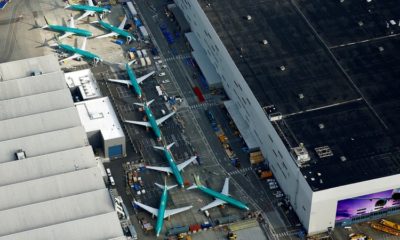Travel
Revolutionizing transportation: The power of rail freight solutions
Published
1 year agoon
By
Siraj
The world of transportation is constantly evolving, and businesses are always on the lookout for efficient and cost-effective ways to move their goods. One solution that has stood the test of time and continues to grow in importance is railway logistics. This vital component of the global supply chain offers a unique blend of reliability, sustainability, and cost-effectiveness that makes it an attractive option for companies of all sizes.
As we delve into the intricacies of railway logistics, we’ll explore how this mode of transportation is shaping the future of freight movement and why it’s becoming an increasingly popular choice for businesses worldwide. From its environmental benefits to its role in global trade, railway logistics is a topic that deserves our attention and understanding.
The fundamentals of railway logistics
At its core, railway logistics involves the planning, implementation, and control of the movement of goods via rail networks. This complex process encompasses everything from loading and unloading cargo to managing schedules and coordinating with other transportation modes. The efficiency of railway logistics lies in its ability to transport large volumes of goods over long distances with minimal interruptions.
One of the key advantages of rail freight transportation is its capacity to handle a wide variety of cargo types. From bulk commodities like coal and grain to containerized goods and even specialized cargo such as automobiles, railways can accommodate diverse shipping needs. This versatility makes it an ideal choice for businesses across various industries, including manufacturing, agriculture, and retail.
Moreover, railway logistics plays a crucial role in intermodal transportation, seamlessly integrating with other modes of transport such as trucks and ships. This integration allows for door-to-door delivery services, combining the strengths of different transportation methods to create efficient and cost-effective supply chain solutions.
Environmental benefits of rail transport
In an era where sustainability is at the forefront of business decisions, railway logistics shines as an environmentally friendly transportation option. Trains are significantly more fuel-efficient than trucks, consuming less energy per ton-mile of freight moved. This efficiency translates to lower greenhouse gas emissions, making rail transport a greener alternative for businesses looking to reduce their carbon footprint.
Furthermore, the ability of trains to carry large volumes of cargo in a single trip means fewer vehicles on the road, leading to reduced traffic congestion and lower overall emissions. As companies increasingly prioritize sustainable practices, the environmental advantages of railway logistics become even more appealing.
The rail industry is also investing in new technologies to further improve its environmental performance. From more efficient locomotives to the use of alternative fuels, these innovations are helping to make railway logistics an even more sustainable choice for the future of freight transportation.
Cost-effectiveness and efficiency in rail freight
When it comes to moving large quantities of goods over long distances, railway logistics often proves to be the most cost-effective option. The economies of scale achieved through rail transport allow businesses to benefit from lower per-unit shipping costs compared to road transport, especially for bulk commodities and high-volume shipments.
The efficiency of rail transport also contributes to its cost-effectiveness. Trains can operate around the clock, with minimal stops and less susceptibility to traffic congestion compared to trucks. This consistency in transit times allows for better planning and inventory management, potentially reducing overall logistics costs for businesses.
Additionally, the long-term infrastructure investments in rail networks often result in lower maintenance costs compared to road networks. These savings can be passed on to customers in the form of competitive freight rates, making railway logistics an attractive option for cost-conscious businesses.
Global trade and railway logistics
Railway logistics plays a vital role in facilitating global trade, connecting inland production centers with ports and international markets. The ability of trains to transport large volumes of goods efficiently makes them an essential link in global supply chains, supporting the movement of raw materials, components, and finished products across countries and continents.
In recent years, initiatives like China’s Belt and Road Initiative have highlighted the importance of railway logistics in international trade. These projects aim to enhance rail connectivity between regions, opening up new trade routes and opportunities for businesses worldwide. As global trade patterns continue to evolve, the role of railway logistics in facilitating cross-border commerce is likely to grow even further.
Challenges and innovations in railway logistics
Despite its many advantages, railway logistics faces several challenges in the modern business environment. These include infrastructure constraints, competition from other modes of transport, and the need for better integration with digital technologies. However, the industry is actively working to address these challenges through innovation and investment.
One area of innovation is the development of smart rail systems that leverage Internet of Things (IoT) technologies to improve efficiency and visibility in rail operations. These systems enable real-time tracking of shipments, predictive maintenance of rail infrastructure, and optimization of train schedules, enhancing the overall reliability and performance of railway logistics.
Another focus area is the improvement of last-mile connectivity, addressing one of the traditional limitations of rail transport. By developing better intermodal solutions and investing in rail-connected logistics facilities, the industry is working to provide more seamless end-to-end transportation services.

Sodziu: The Word With Many Meanings

CinndyMovies: A Simple Guide to Features, Safety, and Why People Talk About It

EchostreamHub: A Simple Guide to the All-in-One Streaming and Media Platform

What You Need to Know About Police Brutality?

12 Sites to Watch Free Online TV Shows with Complete Episodes in 2024






